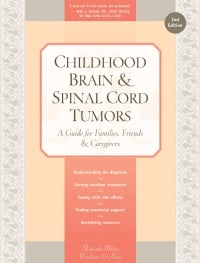Because chemotherapy destroys cells that are produced at a rapid rate, such as those that line the mouth, stomach, and intestines, it can cause diarrhea, ranging from mild (frequent, soft stools) to severe (abundant quantities of liquid stool). Diarrhea during chemotherapy can also be caused by some antinausea drugs, antibiotics, and intestinal infections. After chemotherapy ends and immune function returns to normal, the lining of the digestive tract heals and the diarrhea ends.
The following suggestions for coping with diarrhea come from parents:
- Do not give any over-the-counter drug to your child without approval from the oncologist. She might want to test your child’s stool for infection prior to treating the diarrhea. Frequently recommended drugs for diarrhea are Kaopectate®, Lomotil®, and Immodium®.
- It is very important that your child drink plenty of liquids. The liquids will not increase the diarrhea, but they will replace the lost fluids.
My 3-year-old daughter had stopped drinking from bottles long before her diagnosis. When she first began her intensive chemotherapy, she had uncontrollable, frequent diarrhea. Liquid would just gush out without warning. It was hard for her to drink from a cup, so one night she said in a small voice, “Mommy, would it be okay if I drank from a bottle again?” I said, “Of course, honey.” It was a great comfort to her, and she took in a lot more fluids that way.
- Hot or cold liquids can increase intestinal contractions, so give your child lots of room-temperature clear liquids or mild juices such as water, Gatorade®, ginger ale, peach juice, or apricot nectar.
- Diarrhea depletes the body’s supply of potassium, so give your child foods high in potassium, such as bananas, orange juice, baked or mashed potatoes without the skin, leafy greens, fish, tomato juice, and milk or yogurt (if tolerated).
- Low potassium can cause irregular heartbeats and leg cramps. If these occur, call the doctor.
- Do not serve greasy, fatty, spicy, or sweet foods.
- Do not serve foods high in fiber, such as bran, fruits (dried or fresh), nuts, beans, or raw vegetables.
- Serve bland, low-fiber foods such as bananas, white rice, plain noodles, applesauce, unbuttered white toast, creamed cereals, cottage cheese, fish, and chicken or turkey without the skin.
During treatment, my son had severe diarrhea for a week. He had large amounts of liquid stool 20 times a day. I felt so sorry for him. The doctor cultured a stool specimen, but they never identified a cause. It cleared up after a week of the BRAT diet (bananas, rice, applesauce, toast).
- Keep a record of the number of bowel movements and their volume to keep the doctor informed. Call the doctor if you notice any blood in the stool, or if your child has any signs of dehydration such as dry skin, dry mouth, sunken eyes, decreased urination, or dizziness.
- Keep the area around the anus clean and dry. Wash with warm water and mild soap after every bowel movement, then gently pat the area dry.
- If your child’s anus is sore, check with the doctor before using any non-prescription medicine. She may recommend using Desitin®, A&D ointment®, or Bag Balm® after each bowel movement.
During treatment, my daughter had a terribly sore rectum, which was a big problem. It hurt to have bowel movements, she’d cry and have to squeeze our hands to go, then the urine would run back and burn. She was very itchy. We carried around bags with Q-tips® and every known brand of rectal ointment—A&D®, Preparation H®, Desitin®, and Benadryl®.
- Call the doctor if your child has significant pain with bowel movements, especially if your child has low blood counts.
Table of Contents
All Guides- Introduction
- 1. Diagnosis
- 2. The Brain and Spinal Cord
- 3. Types of Tumors
- 4. Telling Your Child and Others
- 5. Choosing a Treatment
- 6. Coping with Procedures
- 7. Forming a Partnership with the Treatment Team
- 8. Hospitalization
- 9. Venous Catheters
- 10. Surgery
- 11. Chemotherapy
- 12. Common Side Effects of Chemotherapy
- 13. Radiation Therapy
- 14. Peripheral Blood Stem Cell Transplantation
- 15. Siblings
- 16. Family and Friends
- 17. Communication and Behavior
- 18. School
- 19. Sources of Support
- 20. Nutrition
- 21. Medical and Financial Record-keeping
- 22. End of Treatment and Beyond
- 23. Recurrence
- 24. Death and Bereavement
- 25. Looking Forward
- Appendix A. Blood Tests and What They Mean
- Appendix C. Books and Websites

